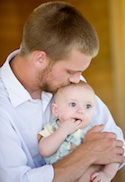I work supporting teachers to comprehend and manage children who find school difficult to understand and work in. Of late, I have been working to assist teachers to understand the impacts on children’s brain development because of their early experiences as babies. Many teachers are only just becoming aware that some children’s brains are ‘wired’ differently as a result of the way in which they have interacted with adults in the first three years of their lives.
So why is it so important that we understand how children’s brains develop from birth – and why do they call the first 3 years the most crucial in this development? Between conception and age three, a child’s brain undergoes an impressive amount of change. At birth, it already has about all of the neurons it will ever have. It doubles in size in the first year, and by age three it has reached 80 percent of its adult volume. New born babies can recognise human faces, which they prefer over other objects, and can even discriminate between happy and sad expressions. At birth, a baby knows her mother’s voice and may be able to recognise the sounds of stories her mother read to her while she was still in the womb. Early brain development is the foundation of human adaptability and resilience, but these qualities come at a price. Because experiences have such a great potential to affect brain development, children are especially vulnerable to persistent negative influences during this period.
For the majority of us our natural reaction to our new born when we become parents is to want to cuddle our child when they cry, pull funny faces and coo when our child responds and above all else, be responsive and protective of our baby. But for some of our children, this is not the reality of their early years. Some are left in homes where parents do not respond quickly and with care to their baby’s basic needs. Furthermore, some are not given quality time with their mother, father or caregiver to bond with them, have someone respond to their facial expression, learn to read emotions and understand language. Instead, some babies and toddlers grow up in homes where they live in unpredictability, chaos and more often fear. Children living in poverty, domestic violence and exposed to traumatic incidents are all at risk of delayed healthy development, due to the impact these environments have on the brain’s ability to grow.
So what does this do to a child’s brain when they are living like this? For a child’s brain to develop in a healthy manner – that is, grow brain cells and connect neural pathways – they need to be able to have the parts of their brain ‘online’ that allow this to happen. When a child lives in an environment where they are not feeling safe or loved, the brain moves into ‘survival mode’. Levels of the stress hormone cortisol increase, and as a result brain cells fail to grow as they would if levels of cortisol were non-existent. The longer a child lives in an environment where they are stressed, fearful or neglected, the longer these levels of cortisol exist within the brain. If we consider the idea that the brain is a garden – then cortisol in itself is the weed killer of the brain.
For our children’s brains to grow in a healthy and appropriate way, children need to have healthy, positive and trusting relationships with those in charge of their care. Love and attention, physical connection and consistency all directly contribute to healthy brain development. And this connection starts in utero. Talking to our baby bump, singing, reading all help form the connection for when the time comes to meeting our little one. Providing consistent routines, interacting and talking to our babies, pulling faces, cooing, smiling and laughing literally grow brain cells in our children. Responding in a timely way to our children’s needs such as changing dirty nappies, feeding when hungry, comforting when sad, and simply just spending time will ensure that our children’s brains develop appropriately. This will ensure that, when the time comes, our children’s brains will be ‘online’ and ready for their next step of learning as they start their formal school journey.






